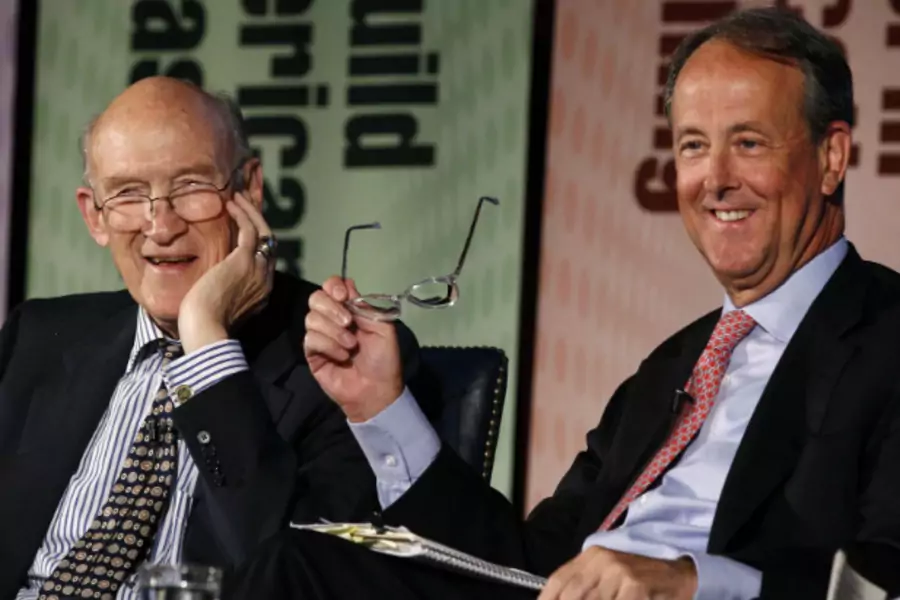Morning Brief: Simpson and Bowles Campaign to Fix the Debt

More on:
Erskine Bowles and Alan Simpson have founded a non-partisan organization to advocate for budgetary reform, the Campaign to Fix the Debt. The organization will focus on policy development and education, as well as outreach and coalition building. It has already attracted former politicians from both sides of the aisle, including Judd Gregg (former Republican senator and governor of New Hampshire) and Ed Rendell (former Democratic governor of Pennsylvania) who will serve as co-chairmen.
As the United States continues to run budgets with high deficits, politicians debate different plans to reduce government costs and to raise revenue. This CFR Backgrounder by Jonathan Masters outlines the competing policy paths on federal fiscal reform, and the global consequences for failing to bring down U.S. debt.
Defense Contractors Warn of Lost Jobs
Executives from the largest U.S. defense contractors testified on Capitol Hill about the impact of $500 billion in automatic cuts to the Pentagon (TheHill). Both chambers have passed measures urging the White House to release specific details on which programs will be cut. The pullback in military spending is one element of the larger “fiscal cliff” of automatic spending cuts and tax increases.
Earlier this year, CFR’s Edward Alden discussed the CBO report on the budget impact of current legislation if Congress does not act. While he states that no action would be bad policy, he suggests that Congress take the current law as a budget baseline.
Debt and deficits. Read more from experts on the challenges in reducing U.S. debt.
Infrastructure
The Case for a National Infrastructure Bank
Last week the Congressional Budget Office (CBO) issued its analysis of a national infrastructure bank (NIB) to fund surface transportation projects. The authors concluded that a NIB would play a limited role in enhancing infrastructure investment by providing new federal subsidies and allowing for a more competitive selection process. Robert Puentes of the Brookings Institution saw the report as careful and thorough, but thought that a stronger case for a NIB could be made by considering projects beyond surface transportation, with a national scope. A NIB could also give the private sector confidence and provide technical assistance.
Chicago’s $7 billion infrastructure plan, which includes a local version of a NIB designed to funnel private money towards the city’s public infrastructure, was the subject of a Policy Initiative Spotlight by CFR Renewing America contributor Steven J. Markovich.
Infrastructure. Read more on how upgrading the nation’s aging network of roads, bridges, airports, railways, and water systems is essential to maintaining U.S. competitiveness.
Education and Human Capital
UC Regents Freeze Tuition until Tax Vote
The University of California’s regents voted to freeze all undergraduate—and some graduate school—tuition rates pending the outcome of Governor Brown’s tax reform ballot measure (LATimes). The tuition freeze will cover the next four months. If the tax hike fails in November, undergraduate tuition rates could increase by 20 percent, more than $2,400. Even with the tuition hikes, course offerings and library hours would also face cuts.
DC and Six States Get NCLB Waivers
Education Week reports that the U.S. Department of Education has granted waivers from many mandates in the No Child Left Behind Act (NLCB) to Washington, DC, and six states—Arizona, Kansas, Michigan, Mississippi, Oregon, and South Carolina. Thirty-three applications have been approved, three more are pending, and states can apply for the next round by September 6. The Education Department is considering giving district-level waivers in states that have not submitted applications.
Education and human capital. Read more from experts discussing ways to improve U.S. education and immigration policies.
The Morning Brief is compiled by Renewing America contributor Steven J. Markovich.
More on:
 Online Store
Online Store